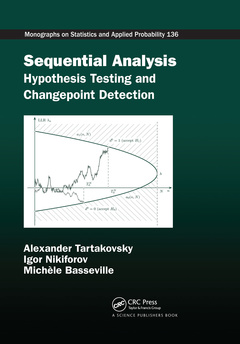Sequential Analysis Hypothesis Testing and Changepoint Detection Chapman & Hall/CRC Monographs on Statistics and Applied Probability Series
Auteurs : Tartakovsky Alexander, Nikiforov Igor, Basseville Michele

Sequential Analysis: Hypothesis Testing and Changepoint Detection systematically develops the theory of sequential hypothesis testing and quickest changepoint detection. It also describes important applications in which theoretical results can be used efficiently.
The book reviews recent accomplishments in hypothesis testing and changepoint detection both in decision-theoretic (Bayesian) and non-decision-theoretic (non-Bayesian) contexts. The authors not only emphasize traditional binary hypotheses but also substantially more difficult multiple decision problems. They address scenarios with simple hypotheses and more realistic cases of two and finitely many composite hypotheses. The book primarily focuses on practical discrete-time models, with certain continuous-time models also examined when general results can be obtained very similarly in both cases. It treats both conventional i.i.d. and general non-i.i.d. stochastic models in detail, including Markov, hidden Markov, state-space, regression, and autoregression models. Rigorous proofs are given for the most important results.
Written by leading authorities in the field, this book covers the theoretical developments and applications of sequential hypothesis testing and sequential quickest changepoint detection in a wide range of engineering and environmental domains. It explains how the theoretical aspects influence the hypothesis testing and changepoint detection problems as well as the design of algorithms.
Motivations for the sequential approach. Background on probability and statistics. Sequential Hypothesis Testing: Sequential hypothesis testing—Two simple hypotheses. Sequential hypothesis testing—Multiple simple hypotheses. Sequential hypothesis testing—Composite hypotheses. Change-Point Detection: Statistical models with changes—Problem formulations and optimality criteria. Sequential change-point detection—Bayesian approach. Sequential change-point detection—Non-Bayesian approaches. Multichart change-point detection procedures for composite hypotheses and multipopulation models. Sequential change-point detection and isolation. Applications: Selected applications.
Alexander Tartakovsky, Igor Nikiforov, Michele Basseville
Date de parution : 12-2020
17.8x25.4 cm
Date de parution : 08-2014
Ouvrage de 572 p.
17.8x25.4 cm
Thème de Sequential Analysis :
Mots-clés :
MP Test; Shiryaev Roberts Procedure; changepoint; Changepoint Detection; detection; Wald’s Likelihood Ratio Identity; false; Asymptotically Optimal; alarm; CUSUM Procedure; delay; Nonlinear Renewal Theory; asymptotic; Nonlinear Renewal; optimality; Iid Case; isolation; Detection Delay; change; SR Procedure; iid; ARL Function; CUSUM Algorithm; GLR Test; Asymptotically Minimax; LLR; Average Detection Delay; Wald’s Approximation; Geometric Prior Distribution; Expected Sample Size; Post-change Parameter; Np Test; Quasi-stationary Distribution; CUSUM Test; EWMA Procedure



